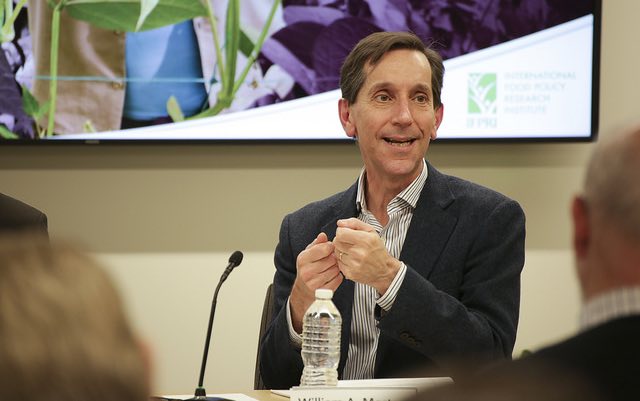The Green Revolution in rice, wheat, and maize production that began in the late 1960s coincided with a calorie-fundamentalist approach to nutrition. While this model promoted greater agricultural yields and increased income, it has proven insufficient to meet the diverse nutritional needs of the world’s poor. In a recent policy seminar, panelists from the World Bank and the Tufts University joined IFPRI researchers to discuss the latest findings of IFPRI’s Advancing Research on Nutrition and Agriculture (ARENA) project, which show that the next challenge for ensuring that agriculture meets the world’s nutritional needs is to ensure greater dietary diversification for people in the Global South.
The ARENA research initiative ran from 2014 to 2017, examining the links between nutrition and agriculture in Bangladesh, Nepal, Ethiopia, and other countries in South Asia and Africa South of the Sahara. The effort combined proprietary and public datasets, said William A. Masters, a professor at the Tufts Friedman School of Nutrition Science and Policy, in ways that “would allow us to have much more peripheral vision, to zoom out into all sorts of data questions” not previously addressed.
Some of its key findings, said IFPRI Senior Research Fellow Derek Headey, pertain to the critical importance of animal-sourced foods rich in high quality protein and micronutrients. ARENA research shows that children who consumed animal-sourced food suffer lower rates of stunting, but also that consumption of these foods is still far too low in developing countries.
ARENA study results showed that a key constraint in poor countries is the exceptionally high cost of animal-sourced foods relative to starchy staples such as cereals. Egg calories, for example, are often 10 times as expensive as cereal calories in Africa South of the Sahara. “Poor people face a double burden: They are poor to begin with, but they also live in economies where the price of nutrient-rich foods is exceptionally high,” Headey said. In many cases, it us not that parents are uninterested in the importance of proper nutrition, they are simply priced out of the capacity to provide it.
Low productivity in the livestock and fisheries sectors is the main driver of high prices, Headey said. Such foods are typically perishable, making it costly to import these products from high productivity countries. Lowering prices and increasing the accessibility of animal-sourced nutrient-rich foods requires a concerted effort among policy makers and governments, Headey said.
One suggested alternative approach would boost domestic markets for perishable goods and allow external markets to supply what local markets cannot produce. An audience member suggested that additional support for farmers could help make diversifying production more feasible. Panelists agreed that it is not enough to craft policies that increase basic calorie intake if those calories are restricted to a particular food group, such as grains. Rather, policies should be designed to encourage more diverse diets, to incorporate animal-sourced food as well as fruits and vegetables, and to ensure proper nutrition, growth, and development.
The scope of the ARENA project goes beyond agriculture to consider the possibility of “cross-cutting policies that would not only benefit a single value chain,” IFPRI Senior Research Fellow James Thurlow said. For instance, he said, policy makers should examine factors such as transportation as a contributor to overall transaction costs—and increasing access to more diverse foods by lowering fuel taxes, improving rural roads, and through other transportation policy changes.
It is especially critical to engage policy makers on the importance of dietary diversity, panelists agreed. “We need to send a strong message” that increased incomes are not the only answer to the challenges of global food security and nutrition, World Bank Senior Nutrition Specialist Leslie K. Elder said.
Researchers and policy makers must also consider economic and environmental costs in efforts to provide healthy diets for the Global South, IFPRI Director General Shenggen Fan said in his closing remarks. Grain production is heavily subsidized to the tune of $500 billion to $700 billion globally per year, he noted, and this contributes to environmental degradation. Calling these subsidies a “policy failure,” Fan suggested that governments reallocate them to ensure dietary diversity and sustainable agricultural systems.
Shelleka Darby is an IFPRI Communications Intern.







